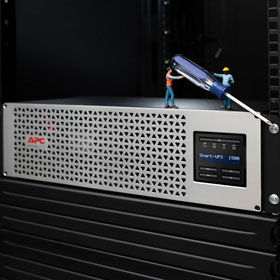Lithium-ion UPS battery
29 January 2020
Power Electronics / Power Management

Up until recently, lithium-ion (Li-ion) batteries have not been commercially adopted as batteries for single-phase UPSs. While used in various other applications, they didn’t provide the necessary balance of price, energy density, power, safety, and reliability to be suitable for UPSs.
However, as battery technology has advanced for the purposes of electric vehicles, Schneider Electric believes this has all changed. Claiming to offer twice the battery life and up to half the total cost of ownership (TCO) compared to valve regulated lead acid (VRLA) batteries, the company has announced the launch of the APC Smart-UPS lithium-ion UPS battery to South Africa.
“We are very excited about bringing this technology to South Africa, where return-on-investment is a crucial decision-making factor,” says George Senzere, pre-sales manager, Anglophone for Secure Power Solutions at Schneider Electric South Africa. “When it comes to return-on-investment, it is important to look beyond the initial spend and assess the TCO so that you can more accurately project the costs and benefits involved. The move from traditional VRLA batteries to li-ion batteries offers several advantages that ultimately lower TCO.”
Lower opex
One of the biggest contributors to this lowered TCO is the low operational expenses (opex) of li-ion batteries. While the capital expenditure (capex) on a VRLA battery UPS may be less than a li-ion battery UPS, VLRA batteries become very expensive due to the costs of refreshing and replacing them, which is necessary for lead acid UPSs.
On the other hand, a li-ion battery will typically match the life expectancy of the UPS itself, about 10 years (compared to 3-5 years of VRLA batteries). That effectively means never having to change the UPS battery, which means you save not only on the cost of the battery, but also on the labour involved in replacing it.
Handles the heat
Part of the reason for their extended life is that li-ion batteries can operate for longer in higher than average temperatures compared to lead acid batteries. While both batteries would see some degradation as the temperature rises, li-ion service life is less affected by higher temperatures than lead acid.
Many of the li-ion batteries being used in UPSs are designed for higher average temperatures (40°C), meaning that the APC Smart-UPS lithium-ion UPS battery will not shy away from the South African climate.
Smaller and lighter
Li-ion batteries are about 30% lighter than VRLA batteries, which also provides advantages. Many customers find they must reinforce floors in rooms that house multiple racks with VRLA UPSs, adding construction costs. In such cases, that alone can make a li-ion-based UPS the more economical option in terms of TCO. They are also smaller, which means they are ideal for tight spaces and fit conveniently into wall-mount racks and small closets.
Further reading:
ABB’s Mission to Zero drives South Africa’s energy transition
ABB Electrification Products
Power Electronics / Power Management
ABB Electrification is charting a bold path towards a net-zero future with its Mission to Zero programme, a blueprint that combines energy efficiency, electrification, and digital innovation to accelerate the transition to clean energy.
Read more...
Energy harvesting using a battery-less IoT system
NuVision Electronics
Editor's Choice Power Electronics / Power Management
Energy Harvesting plays an essential role in the foundation of ambient IoT, a new generation of ultra-low power connected devices that operate by drawing energy from their environment instead of relying on traditional batteries.
Read more...
Driving power, defining performance
Future Electronics
Power Electronics / Power Management
Vishay’s portfolio of inductors, current sense resistors, and MOSFETs provides a comprehensive solution for intelligent power management.
Read more...
Battery simulator module simplifies BMS testing
Test Dynamics
Power Electronics / Power Management
The PXI/PXIe solution from Pickering Interfaces offers a scalable, modular design for faster development cycles, lower total cost of ownership, and improved safety.
Read more...
DC PSU: The cornerstone for efficient solar-storage systems
Vepac Electronics
Power Electronics / Power Management
PV energy storage systems are evolving and DC power supplies, with their technical characteristics that are naturally compatible with new energy, have become a key carrier for improving system energy efficiency.
Read more...
Why local manufacturing, maintenance and support are key to the success of South Africa’s energy future
Power Electronics / Power Management
Although new renewable generation capacity is being developed, the current transmission infrastructure may not fully support the connection of these sources to the national grid or adequately deliver power to areas of high demand.
Read more...
Converter power modules for 48 V networks
Altron Arrow
Power Electronics / Power Management
The economic and quality-of-life benefits of electrification is driving the adoption of HV to 48 V DC-DC conversion across many markets with 48 V power modules becoming more common.
Read more...
The importance of power integrity
Spectrum Concepts
Power Electronics / Power Management
[Sponsored] Behind every high-speed system lies the need for power integrity. Without it, even the cleanest signal paths become compromised.
Read more...
Precise multi-vital sign monitoring
Future Electronics
Power Electronics / Power Management
The AS7058 by ams OSRAM is an integrated multi-vital sign monitoring device, which provides a complete photoplethysmogram, electrocardiogram, body impedance sensor, and electrodermal activity sensor.
Read more...
Automotive battery diagnostics tester
Comtest
Power Electronics / Power Management
Midtronics’ MVT handheld battery tester is a revolutionary tool, powered by MDX-AI, which is set to redefine the standards of battery diagnostics and testing in the automotive industry.
Read more...


